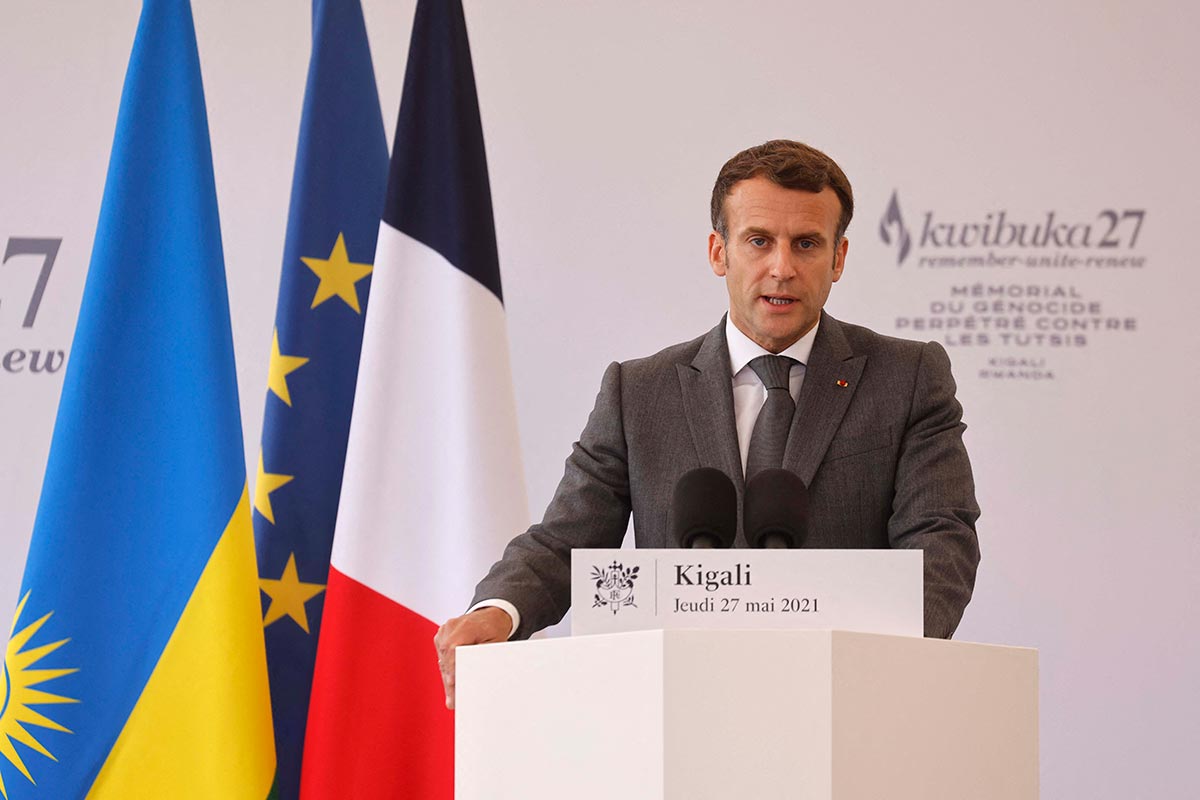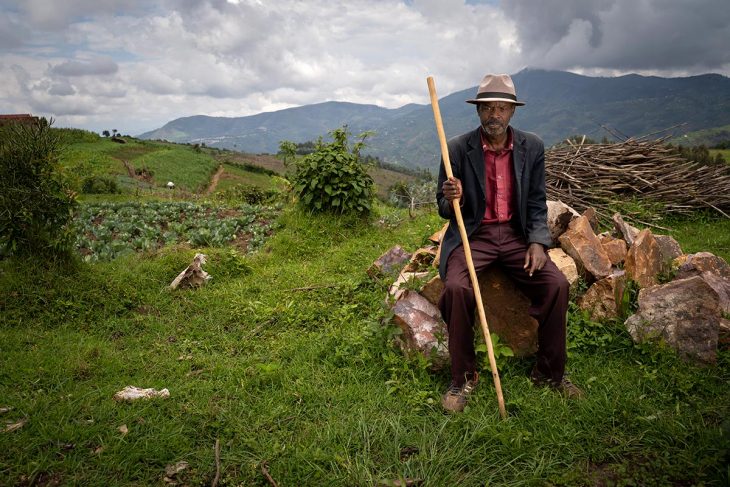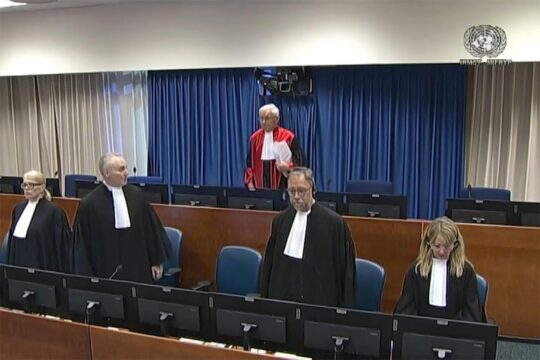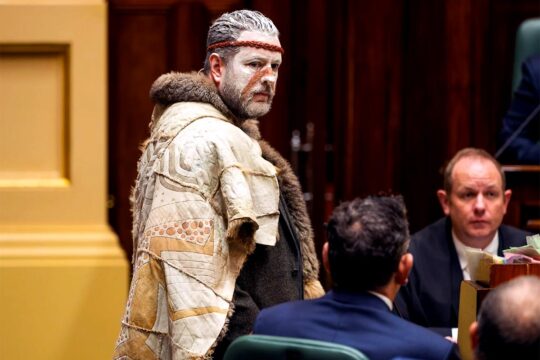“Only those who survived the horrors can maybe forgive, give us the gift of forgiveness.” With these carefully crafted words, pronounced on May 27 at the Genocide Memorial in Kigali, President Macron spoke directly to the survivors of the genocide committed in 1994 against the Tutsi population of Rwanda. It was a subtle request for forgiveness, instead of the expected apology. Macron said he had come to « recognise France’s responsibilities » in this genocide. France “was not complicit” in the genocide, he said, but it has a duty “to face history head-on and recognise the suffering she has inflicted on the Rwandan people by too long valuing silence over the examination of the truth”. "By wanting to prevent a regional conflict or a civil war, it was in fact standing by a genocidal regime. By ignoring the warnings of the most lucid observers, France assumed a damning responsibility in a spiral that led to the worst, even though it was precisely trying to avoid it," he continued.
Emmanuel Macron put an end to speculation on Tuesday 18 May, at the end of a summit in Paris on revival of Covid-hit African economies, in which Rwandan President Paul Kagame took part. “I confirm my trip to Rwanda at the end of May. This visit will focus on political, remembrance, economic and health issues and themes affecting the future," said the French president. “Together with President Kagame, we are committed to turning a new page in our relationship, and building constructively.”
And so the French head of state was in Rwanda on May 27, a week after receiving Kagame, to revive bilateral relations that have been strained for 27 years because of France's controversial role in Rwanda before, during and after the 1994 Tutsi genocide.
Asked whether he would present France's apologies in Kigali as the United States, the United Nations and Belgium have already done, Macron had replied to the press on May 18: "What I have to say there, I will say at that time.” Kagame had indicated the day before in an interview with the newspaper Le Monde: "I leave it to President Macron to choose the words. An apology cannot come on demand. They must be sincere. It is not up to me, or anyone else, to ask for an apology.”

France is responsible but not “complicit”
This visit, the second by a French president to Rwanda since 1994, comes after the publication of two reports on France's role in Rwanda from 1990 to the 1994 genocide. The first report, called the "Duclert Commission", was handed over to Macron on March 26, after he commissioned it two years earlier from a group of French historians. It concluded that France, then led by François Mitterrand and the main Western ally of the Hutu regime in Kigali at the time, carried "heavy and damning responsibilities”. "The French authorities showed a continuous blindness in their support for a racist, corrupt and violent regime," the report said. The investigation, however, ruled out any "complicity" of France in the genocide of the Tutsis: "If what is meant by that is a will to join the genocidal enterprise, there is nothing in the archives to demonstrate this," wrote the authors of the investigation led by historian Vincent Duclert.
The Rwandan president hailed "an important step and a signal of change," while announcing that his country would have "its say". This came with Rwanda's receipt on April 19 of a report it had commissioned in 2017 from the American law firm Levy Firestone Muse. This report rejects the idea of Paris's blindness. "The French state was neither blind nor unaware of a foreseeable genocide," the Muse report states. For the authors, France continued to provide "unwavering support" to the regime of President Juvénal Habyarimana, even though it knew that he was preparing a genocide. Like the Duclert report, the Muse report does not conclude that France was complicit in the genocide.
“An important step”
"These two reports come to different conclusions, but they have in common that they move the lines and open up a new political space," reacted the French presidency, hailing an "important step”. The head of Rwandan diplomacy, Vincent Biruta, had just declared in an interview with the newspaper Le Monde that his country "will not bring this issue before a court”. This tone contrasts with that of another report, published in August 2008. Produced by a commission chaired by the late Jean de Dieu Mucyo, former Minister of Justice and Attorney General of Rwanda, this report concluded that "the French state played an active role in the preparation and execution of the genocide”. The Mucyo report, which implicated 13 political figures and 20 French military personnel, asked the Rwandan government to “reserve the right to file a complaint against the French government for its responsibility”.
This damning report was made public two years after Kigali broke off diplomatic relations with Paris. The break followed the launch on November 22, 2006, by French judge Jean-Louis Bruguière of arrest warrants against nine people close to Kagame for the April 6, 1994 attack on former President Habyarimana's plane.
After a long series of proceedings, the French justice system closed the case on July 3, 2020. The Paris Court of Appeals confirmed the dismissal of the investigation into this attack, due to lack of evidence.
“It’s a good start”
But Rwanda wants France to do more: to try all genocide suspects present on its territory. In mid-April, two Franco-Rwandans, including Catholic priest Marcel Hitayezu who works in a parish in southern France, were arrested for genocide and complicity in genocide. In May 2020, French cooperation led to the arrest near Paris of businessman Félicien Kabuga, a wealthy relative of the Habyarimana family. Indicted in 1997 by the International Criminal Tribunal for Rwanda (ICTR), he was the most wanted fugitive from justice in the world.
"I think it's a good start. More can no doubt be done," Rwandan President Kagame said in a May 17 interview with RFI and France 24. According to him, many other suspects are free on French territory, including Agathe Kanziga, widow of Juvénal Habyarimana. "She is on the list, on the very long list. She is at the top. But it is France that will make the decision. I am not going to give advice.” So far, France has refused to extradite Rwandans wanted by their country's justice system.
In Kigali on May 27, Macron did not fail to respond to the Rwandan request: "Recognizing this past is also and above all continuing the work of justice, by committing ourselves to ensure that no one suspected of genocide crimes can escape the work of the judges," he said.
Nicolas Sarkozy visited Rwanda in February 2010. At that time, Sarkozy admitted "errors of appreciation" on the part of his predecessors, but refrained from apologising. "What happened here is a defeat for humanity," the head of the Elysée Palace acknowledged. "What happened here obliges the international community, including France, to reflect on its errors that prevented it from preventing and stopping this appalling crime (...) We must look further, organize reconciliation. Errors of appreciation, political errors were made here and have had absolutely dramatic consequences," he added during a joint press conference with President Kagame.
Belgium ask forgiveness
Ten years earlier Belgium, through the voice of its Prime Minister at the time Guy Verhofstadt, had gone further. "In the name of my country, I bow to the victims of genocide. In the name of my country, in the name of my people, I ask for your forgiveness," said the head of the Belgian government. "I assume here before you the responsibility of my country, of the Belgian political and military authorities," Verhofstadt told top Rwandan officials.
Belgium, the former colonial power in Rwanda, had a large military contingent deployed under the United Nations banner in 1994. After the killing of ten Belgian peacekeepers on April 7 by elements of the Rwandan government army, Brussels decided to withdraw its troops, leaving the field free for the killers.
Bill Clinton admits responsibility
Belgium was preceded on this path by the United States. During a three-hour visit to Kigali on March 25, 1998, President Bill Clinton said from Kigali International Airport: “The international community, together with nations in Africa, must bear its share of responsibility for this tragedy, as well. We did not immediately call these crimes by their rightful name: genocide.
“All over the world there were people like me sitting in offices, day after day after day, who did not fully appreciate the depth and the speed with which you were being engulfed by this unimaginable terror,” Clinton told an audience which included Rwandan genocide survivors.
UN admission of failure
On May 7 and 8 the same year UN Secretary General Kofi Annan was also in Rwanda
For what he called a “mission of healing”. During his visit, the late Annan admitted the UN’s failure in 1994. “We must and we do acknowledge that the world failed Rwanda at that time of evil,” he said. “The international community and the United Nations could not muster the political will to confront it. The world must deeply repent this failure.”
Coming from the man who was in charge of UN peacekeeping operations at the time of the genocide, these words did not go down well. The Rwandan authorities went so far as to boycott the reception organized in honour of the UN chief. The head of Rwandan diplomacy, Anastase Gasana, now in exile, called for a commission of inquiry into the role of the UN in the genocide and demanded compensation for the survivors.
No words, however, were more sensitive and more expected than those of France. Nearly three decades after the Tutsi genocide, President Macron's visit was both an acknowledgement of the burden of history and signalled a desire to overcome it in the geopolitical interests of both countries. He did not issue a state apology but made a genuine request for forgiveness from the Rwandan survivors.
Article updated at 14.32 PM







